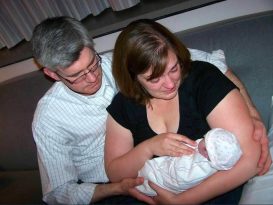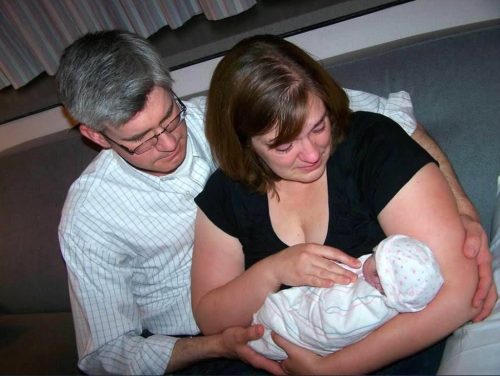By Maria Wiering | OSV News
Eileen Tully remembers looking to the stars and asking God, “Are you real?”
She had always been a devout Christian and had come into full communion with the Catholic Church as an adult. Her previously rock-solid faith had been shaken by the loss of three children in less than three years: the first through an early miscarriage and then twins, one dying in utero following a medical procedure and the second dying at 47 days old.
On paper, Elisabeth Kübler-Ross’ five stages of grief seemed so linear — denial, anger, bargaining, depression and acceptance. “But this just felt like I had been leveled by a hurricane or tornado or something, and so I didn’t even know where to start to pick up the pieces,” Tully said.

As Tully waded through her grief, she eventually found solace in the rosary. In 2020, after experiencing a second miscarriage, she launched Present in the Pain, an apostolate to help other mothers who have lost a child of any age, but especially those suffering from miscarriage, stillbirth and infant loss.
Tully runs the ministry from her family’s acreage in rural New Hampshire. She and her husband of 18 years, Patrick, have six living children — ages 4 to 16, whom Eileen, 49, homeschools. Present in the Pain, she said, fills a need often unaddressed by the church: the accompaniment of women and men who have lost a child, especially during pregnancy.
When Tully experienced a miscarriage early in her third pregnancy, she hadn’t anticipated how difficult losing a baby would be, or how the grief would differ from other kinds of losses she had suffered.
She thought of friends she knew who had miscarried and wished she had done things differently — brought them dinner or babysat their children so they could have time to themselves.
Soon she was pregnant again, and had a son. Then, shortly after the Tullys’ fifth anniversary, Eileen was pregnant again. She guessed twins even before her doctor confirmed it with an ultrasound.
“We were going to have five kids under 5, and we were just overwhelmed and thrilled,” she said.
But, halfway through the pregnancy, they discovered the twin girls had Twin-to-Twin Transfusion Syndrome, and one baby was pumping blood into the other. “One of them was very small, and the other one was having heart issues because she was trying to process not just the regular exchange of blood that she should have been getting with me, but also the blood from her sister,” Tully said.
She had in utero surgery to try to correct the complication, but they learned the day after surgery that the smaller twin, Fiona, had died. Tully went into labor May 8, 2011, when the remaining twin, Brigid, was 28 weeks old. The baby had breathing problems and spent 47 days in the newborn intensive care unit, or NICU, before dying of an infection from the ventilator.
“My miscarriage was difficult, but this — I just felt like I don’t know how I could get out of bed,” she said. “I thought I was just done. I had significant trauma. … Then it was time to drive and figure out how to do that.”
Their parish priest baptized Brigid and offered Mass for the twins, but there was no bereavement group at the parish or ongoing pastoral support. Tully felt like she was calling out to God and only hearing silence.
“I fumbled my way along for years — many more years than I thought it was going to take to heal from that,” she said.
Her prayer life was particularly impacted. As a former Protestant, she had been more comfortable with spontaneous, unmemorized, prayers; but she didn’t know what to say to God, or if prayer even mattered. She had never prayed as hard as she did for the twins’ lives, but they still had died.
She clung, however, to an image she had received in prayer during Mass just days after Brigid had died, when she felt like she was given a flash of understanding. In that image she was baking cookies, and trying to prevent a young child from eating the chocolate chips. The child couldn’t understand that they were for the cookies, and in withholding them, she was preparing something better. But she could still understand why the child was upset and comfort him, even while not giving him what he wanted.
“I just had this awareness that I was … (the child) in this situation, and God was just like, ‘Listen, I know you can only see this,'” she said, cupping her hands around her eyes to narrow her vision, “‘and I know it feels awful and terrible, and your crying is totally justified and warranted, but I’m you in this situation, and I need you to trust that I have something for you that’s better, and I will use this for it.'”
That message “didn’t take away the pain,” she said through tears, “but it was like a balm on my heart, like, ‘OK. I trust that you (God) can somehow use this for my good and that you’ve got a plan in the works. … I only have this limited perspective, and you have all of eternity in mind.'”
Still, she wrestled with faith and prayer for years, but eventually found comfort in the repetition of the rosary, which she first prayed on a whim. That was a big deal for Tully, who had struggled to understand devotion to Jesus’ mother.
Drawing close to Mary, especially under her title as Our Lady of Sorrows, was a game-changer for Tully. She felt called to share what she had experienced with other grieving mothers. After thinking about the idea for several years, she launched her ministry with plans for an in-person retreat for March 2020. With the COVID-19 pandemic, she adapted the retreat to a web series.
Today, Present in the Pain’s core offering is an online retreat series, either cohort-based or self-paced, with regular virtual gatherings for reflection and discussion. “It’s just about offering validation and accompaniment for women in the difficulty of the early days of grief, like when grief is so profound and you just didn’t realize how much of your life it touches,” Tully said.
She also offers an online community for grieving mothers and several resources, including a podcast, greeting cards for pregnancy and child loss, and a guide for praying with Our Lady of Sorrows. Together, she and Patrick also offer grief support for men and women.
According to the National Library of Medicine, an estimated 26% of all pregnancies, and up to 10% of clinically recognized pregnancies, end in miscarriage, the loss of pregnancy less than 20-weeks gestation.

After 20 weeks, a child that dies in utero is recognized as stillborn. The U.S. Centers for Disease Control and Prevention states that about 1 in 175 births are stillbirths, with about 21,000 annual stillbirths in the United States.
Erin Baro, 47, first experienced Tully’s retreat in June 2020, two years after losing her daughter Valancy, who had been born prematurely and died of pneumonia at 29 days old. Baro had tried other grief support ministries, but none resonated like Present in the Pain. She has had three miscarriages since that first retreat and continues to connect regularly with Tully’s ministry as she grieves her babies.
“She gives you this space to be seen and to be heard, but what I found to be really different about Eileen is how she connects very personally one-on-one with you, that you can tell she takes your story in,” said Baro, who lives in Lincoln, Rhode Island. “She chews on it, and what she gives you back tells you that she’s just heard you. … Not only did she hear me, she validated me. She’s also telling me she’s been there, too, so you don’t feel so alone.”
Whitney Whitmore, 35, said Tully’s ministry also has helped her to process grief, even as she helps others stay close to Christ following miscarriage, infant loss or adverse prenatal diagnosis with a prayer-focused ministry she co-founded, Lily of the Valley.
Her son Colin was diagnosed in utero with a rare medical condition that would not allow him to survive outside the womb. His heart stopped at 34-weeks gestation, and he was stillborn in April 2021.
“I feel like the grief always stays with you,” said Whitmore, who lives in Raleigh, North Carolina. “What I found with Eileen and her ministry is her emphasis on Our Lady of Sorrows … Mary is just like the perfect prayer warrior for all of us that are going through sorrow and loss.”
Miscarriage and infant-loss ministry is an underserved need in the Catholic Church, Tully and Whitmore said. While their ministries, and others such as Red Bird Ministries, aim to fill a longtime void, parishes often lack the resources, or pastors lack the knowledge, of how to care for grieving parents in their pews.
“There’s not enough support from the church, especially from the Catholic Church, which holds life in such high esteem,” Tully said. “Women and families sometimes just feel like there’s not a recognition that they have experienced the loss of a life. … This is a different kind of support that’s needed, because it’s just so impactful on the family.”
This is something Julia Dezelski recognizes and has been working to address. The associate director for marriage and family life for the U.S. Conference of Catholic Bishops’ Secretariat of Laity, Marriage, Family Life and Youth, Dezelski is crafting a list of resources for pastors to complement the pastoral guidance on the topic included in the 2021 document on family life titled “Called to the Joy of Love: National Pastoral Framework for Marriage and Family Life Ministry.”
Dezelski noted several books by Catholic authors and new ministries, like Present in the Pain, are now addressing this unique suffering. “It’s really beautiful to see laity really rising to the occasion and also contributing to the church and this form of pastoral care,” she said.
One way the church at large could improve pastoral accompaniment for parents who have experienced miscarriage or child loss is to include that ministry in seminarians’ practicum, Dezelski said.
However, she said, it may be challenging to convince seminaries to add yet another component to seminarians’ broad academic and pastoral training they are already undertaking. Dezelski said she hopes the USCCB’s resource guide can fill a gap for seminarians and clergy.
Tully said that the pain of child loss can linger for years, and women who miscarried decades ago have sought healing through her retreat.
“Sometimes … you just never had the chance to process it and to let yourself acknowledge that it was OK to grieve,” she said. “It’s OK that you’re still sad about it.”
– – –
Maria Wiering is senior writer for OSV News.






















